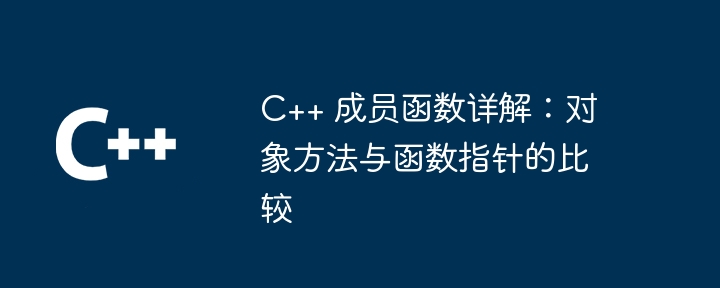
The difference between member functions and function pointers: Syntax: Object methods use dot syntax, and function pointers use the dereference operator. Implicit parameters: Object methods have this pointers, function pointers do not. Accessibility: Object methods can only access data within the object, and function pointers can access any identifier. Efficiency: Object methods are generally slower than function pointers because of the need to look up the this pointer.

C Detailed explanation of member functions: Comparison of object methods and function pointers
Introduction
In C, a member function is a function included in the class definition. They are like ordinary functions, but have a special implicit parameter: the object itself (called the this pointer). Member functions can access and modify an object's private data and methods.
Object method
Object method is a type of member function that can be called through an object like a normal function. The syntax is as follows:
object.function(args)
For example:
class Person {
public:
void set_name(std::string name) { this->name = name; }
};
Person p;
p.set_name("John Doe");Function pointer
The function pointer is a pointer variable pointing to a function. Function pointers can be assigned to variables or passed to other functions. The syntax is as follows:
typedef return_type (*function_pointer)(args);
For example:
typedef void (*set_name_function)(std::string); set_name_function set_name_ptr = &Person::set_name; set_name_ptr(p, "Jane Doe");
Comparison
There are several key differences between object methods and function pointers:
this pointer), while function pointers do not. this pointer. Practical Case
Let us consider a simple student management system using object-oriented programming. We can create and manage student objects using object methods:
class Student {
public:
void set_name(std::string name) { this->name = name; }
void set_grade(int grade) { this->grade = grade; }
void print() { std::cout << "Name: " << name << ", Grade: " << grade << std::endl; }
};
int main() {
Student student1;
student1.set_name("Alice");
student1.set_grade(90);
student1.print();
return 0;
}On the other hand, we can also use function pointers to provide the same student management functionality:
typedef void (*set_name_function)(Student*, std::string);
typedef void (*set_grade_function)(Student*, int);
typedef void (*print_function)(Student*);
void set_name(Student* student, std::string name) { student->name = name; }
void set_grade(Student* student, int grade) { student->grade = grade; }
void print(Student* student) { std::cout << "Name: " << student->name << ", Grade: " << student->grade << std::endl; }
int main() {
Student* student1 = new Student();
set_name_function set_name_ptr = &set_name;
set_grade_function set_grade_ptr = &set_grade;
print_function print_ptr = &print;
set_name_ptr(student1, "Alice");
set_grade_ptr(student1, 90);
print_ptr(student1);
delete student1;
return 0;
}In both examples, We have all successfully created and managed student data. Which method to choose depends on specific needs and performance requirements.
The above is the detailed content of Detailed explanation of C++ member functions: comparison of object methods and function pointers. For more information, please follow other related articles on the PHP Chinese website!
 The difference between typedef and define
The difference between typedef and define
 Usage of typedef in c language
Usage of typedef in c language
 What are the differences between c++ and c language
What are the differences between c++ and c language
 Recommended learning order for c++ and python
Recommended learning order for c++ and python
 Cost-effectiveness analysis of learning python and c++
Cost-effectiveness analysis of learning python and c++
 Is c language the same as c++?
Is c language the same as c++?
 Which is better to learn first, c language or c++?
Which is better to learn first, c language or c++?
 The difference and connection between c language and c++
The difference and connection between c language and c++




